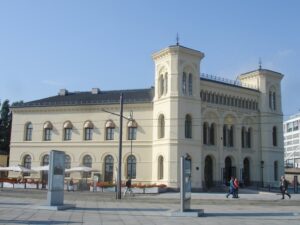
The Nobel Peace Prize
Submitted by Kathy Dollymore
Norway has ever so many winter traditions, such as skiing, building snow lanterns, drinking gloegg, overeating at the julebord, changing to winter tires, if only to mention a few. There is, however, one yearly tradition of global impact that takes place in Oslo every December 10th. Except for the war eras it has been recurring for the last 118 years. I am referring to the award ceremony of the Nobel Peace Prize which is referred to as the world’s most prestigious award. The event takes place in the Oslo City Hall with the Norwegian royal family present. Altogether 107 single

individuals and 27 organizations have to date received the Nobel Peace Prize. The recipient this year was Ethiopian Prime Minister Abiy Ahmed Ali for his efforts to achieve peace and international cooperation, particularly for his actions to resolve the border conflicts with neighboring Eritrea.
But how did such a small country, geographically distant from most of the world’s trouble centers, get to determine “who, in the preceding year has done the most or the best work for fraternity between nations, for the abolition and reduction of standing armies, and for the holding and promotion of peace congress” – to cite the Criteria used by the Nobel Committee for choosing a worthy recipient?
The Nobel Peace Prize, at the present value of 10 million Swedish kroner, is the result of a legacy willed by the Swedish chemist and industrialist Alfred Nobel who died in 1896. He had accumulated large amount of wealth by producing dynamite and ballistite. Altogether five Nobel prizes are delivered every year, the ones for outstanding advances in physics, chemistry, economics, and for literature are awarded in Stockholm, Sweden. However, for reasons Mr. Nobel never explained, he determined that the Peace Prize should be awarded in Norway. The two countries were in a union at the time, and many theories have been suggested why he accorded the honor of delivering the tribute to international peace to the Norwegians. Possibly he was distrustful against the Swedish militant traditions, or he was impressed by the Norwegian Parliament having become closely involved with the Inter-parliamentary Union’s efforts to resolve conflicts by mediation and arbitration. He had also become an admirer of Bjørnstjerne Bjørnson’s international actions to maintain world peace. That an industrial producer of explosives at all decided to legacy some of his fortunes to world peace is also a question much debated among historians. The possibility is that he wished to mend for some of the suffering his production might have created. It is also known that he had a close friendship with Bertha von Suttner, a peace activist, who later became a Peace Price recipient.
The determination by the Nobel Committee of who every year should receive this honorable award is rather elaborate. Each year the committee invites qualified people world-wide to submit nominations for the Peace Prize. Normally the suggestions must be received by the Nobel Committee in the beginning of February in the award year. The number of nominations has seen a steady increase. The latest record was set in 2011 when 241 nominations were submitted. The statutes of nomination do not allow for information about nomination considerations or investigations to be released to the public for at least 50 years after the prized has been awarded. The fact that somebody has been nominated, but not selected, means very little historically. As a matter of fact, in 1939 Adolf Hitler was suggested as the recipient (seemingly mockingly) after his insincere peace agreement with Neville Chamberlain. The presented nominations are considered by the Nobel Committee at a meeting when a short list of candidates is created for further review by the Director, the Research Director, and a small number of academics with expertise in the fields relating to the candidates. Advisors usually have some months to complete their reports. The Committee seeks to arrive at an unanimous decision, but this is not always possible. The final decision is reached in mid- to late September, and then publicized in early October. The yearly announcement of the recipient for the Nobel Peace Prize has great impact. It is covered by the news media all over the world.
Whereas most of the selections for the Peace Prize are generally agreed upon, there are occasions when The Nobel Committee has received criticism, both in Norway and internationally for their choice of recipients. Such controversy occurred in connection with according to prize to Mikhail Gorbachev (1990), Le Duc Tho (1973), Aung San Suu Kui (1991), Yasir Arafat, Shimon Peres and Yitzak Rabin (1994), Henry A. Kissinger (1973), Menachem Begin (1978) and there were several others. Some of these selections resulted in committee members resigning, or the nation questioned whether the system of selection should be totally revised. Mr. Tho from North Vietnam declined to receive the prize, insisting that there yet was no peace in Vietnam, and furthermore that had no time for “such bourgeois sentimentalities”. Henry Kissinger gave his prize money to charities, then offered to return the medal after South Vietnam fell to the North. Additionally, there have been noticeable omissions. Elanor Roosevelt, U Thant and Mahatma Gandhi are some of them. The most obviously deserving of the Peace Prize is said to be Mr. Gandhi. He was nominated in 1937, 1938, 1939, and 1947. He was nominated again in January 1948. However, just days after the nomination he was assassinated. The Nobel Committee much regretted their failure to act in time, and chose not to choose anybody for that year, with the explanation “that no living person was found deserving of the award”.

Now should you happen to find yourself exiting the Oslo Central Train Station, take a moment and walk across the plaza where you can locate the Nobel Center for the Peace Prize. An impressive amount of world leaders and activists have benefitted by the decisions of the folks affiliated with this building: Fridtjof Nansen, Elie Wiesel, Dr. Martin Luther King, Dalai Lama, Doctors without Borders, Nelson Mandela, Jimmy Carter, The Red Cross, Barak Obama, and Mother Teresa to mention a few. So all said, I believe that over the years the Nobel Prize Committee of Norway made some very valid decisions.
References: Norge, A portrett av en nasjon, Noberprize.org, Wikipedia, Fredsprisen, Norge og Verden (Geir Lundestad).